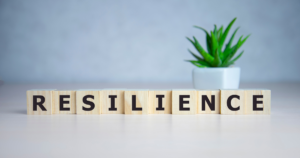Cultivating Resilience: Inspiring Examples and Effective Strategies:

1) The essence of resilience:
Versatility is the capacity to return from misfortune, adjust to difficulties, and flourish in spite of mishaps. It involves emotional strength, mental fortitude, and a positive outlook on difficult circumstances. It empowers individuals to cope effectively with stress, view setbacks as opportunities for growth, and build supportive relationships.
2) Real-life examples of Resilience:
Resilience is exemplified through personal stories, professional challenges, and societal responses to adversity.
Personal Stories of Resilience:
Personal resilience shines through in individuals overcoming profound loss, illness, or hardship. For instance, individuals who turn personal tragedy into personal growth, finding strength and meaning in difficult circumstances, showcase remarkable resilience.
Professional resilience:
Professionally, resilience is demonstrated when individuals face career setbacks, such as job loss or industry changes, and adapt by acquiring new skills, exploring new opportunities, and emerging stronger from challenges.
Community and social resilience:
Communities display resilience by rallying together after natural disasters, rebuilding homes, and supporting each other through hardship.
Societies show resilience during global crises, uniting to address challenges like pandemics or economic downturns with collective strength and determination.
2) Building a Resilient Life: Key Strategies:
Building resilience involves adopting specific strategies that empower individuals to thrive in the face of adversity.
Adopting a growth mindset:
A growth mindset focuses on embracing challenges as opportunities for learning and growth. By reframing setbacks as temporary and surmountable obstacles, individuals cultivate resilience and maintain motivation to overcome adversity.
Strengthening Emotional Intelligence:
Emotional intelligence enhances resilience by enabling individuals to recognize and manage emotions effectively. By developing self-awareness, empathy, and emotional regulation skills, individuals can navigate stressful situations with clarity and composure.
Establishing a Support System:
A strong support system provides emotional and practical support during difficult times. Cultivating relationships with friends, family, mentors, and peers creates a network of encouragement and assistance, bolstering resilience and fostering a sense of community.
3) Daily Habits for Resilience:
Developing daily habits that promote resilience is essential for navigating life’s challenges with strength and adaptability.

Self-care practices:
Self-care is foundational for resilience, ensuring individuals maintain physical, mental, and emotional well-being.
-
Physical Health: Engage in regular exercise, eat balanced meals, and prioritize adequate sleep.
-
Mental Well-being: Practice mindfulness through meditation or deep breathing exercises to reduce stress.
-
Emotional Wellness: Cultivate hobbies, spend time with loved ones, and seek professional support when needed.
Continuous learning and development:
Continuous learning fosters resilience by expanding knowledge and skills and enhancing adaptability and confidence.
-
Lifelong Learning: Read books, take courses, or attend workshops to stay informed and engaged.
-
Skill Development: Acquire new skills relevant to personal or professional growth, fostering resilience through competence and versatility.
Maintaining a sense of purpose:
A sense of purpose provides direction and motivation, anchoring resilience during times of uncertainty.
-
Identify Values: Reflect on personal values and goals to align daily actions with long-term aspirations.
-
Contribution: Volunteer or engage in activities that contribute to the community, fostering a sense of fulfilment and resilience.
Conclusion:
In conclusion, cultivating daily habits that prioritize self-care, continuous learning, and maintaining a sense of purpose is fundamental to building resilience. By integrating these practices into daily life, individuals can enhance their ability to navigate challenges with strength, adaptability, and a positive mindset. Embracing self-care fosters holistic well-being, continuous learning expands skills and knowledge, and maintaining a sense of purpose provides clarity and motivation. Together, these habits empower individuals to thrive in the face of adversity and lead fulfilling lives.
